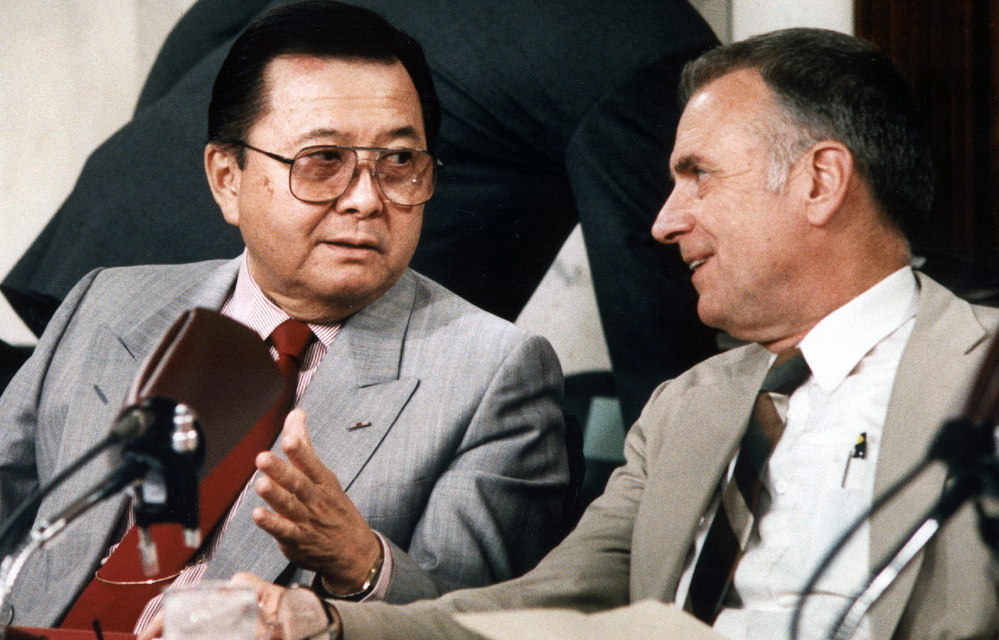Sen. Daniel Inouye (left), who died at 88 Monday, served as the chairman of the Senate committee investigating the Iran-Contra affair in 1986.
Sen. Daniel Inouye (left), who died at 88 Monday, served as the chairman of the Senate committee investigating the Iran-Contra affair in 1986.
Chris Wilkins/AFP/Getty ImagesSen. Daniel Inouye of Hawaii, 88, has died of respiratory complications, according to reports from the AP and other news agencies. The World War II veteran, a Democrat, had been the most senior member of the Senate. He joined its ranks in 1963, shortly after Hawaii became a state.
At the time of his death, Inouye was the president pro tempore, placing him third in the line of succession, behind Vice President Biden. He was also the chairman of the Senate Appropriations Committee.
According to the senator's staff, he died at Walter Reed National Military Medical Center, just after 5 p.m. ET.
His Senate office has posted a statement, which reads in part:
"When asked in recent days how he wanted to be remembered, Dan said, very simply, 'I represented the people of Hawaii and this nation honestly and to the best of my ability. I think I did OK.'"
His last words, according to the statement, were simply, "Aloha."
For many Americans, Inouye's tenure in the Senate will forever be tied to the way he comported himself during two controversial episodes in America's recent history, both of which played out before a national television audience.
He served on the Watergate Commission that investigated the infamous burglary in the early 1970s, an inquiry that led to many indictments and ultimately the resignation of President Richard Nixon. And in 1986, Inouye led the Iran-Contra Committee that investigated the illegal funneling of weapons.
Throughout those tumultuous events, Inouye won praise for maintaining a sense of equilibrium and an unbiased interest in the truth.
In a 2011 NPR interview marking the 70th anniversary of the Pearl Harbor attack, Inouye was asked by Tell Me More host Michel Martin if there were "an issue today that you would like to speak on that you would like people to be thinking about?"
Here is the answer he gave:
"The lesson is one that should be repeated time and again, that we do have an extraordinary Constitution. We do have extraordinary sets of laws, but I have found that, in the history of mankind, whenever there's a crisis like that of a war, some of the leaders set them aside and forget it. For example, I think the law was rather clear about placing 120,000 Japanese in what we call concentration camps and we had committed no crime. All properties were lost. Our freedom was lost.
"But there is greatness in this because, after the war, the United States of America was strong enough to admit wrong. When confronted, they said, yes. We did something wrong. We apologize and we want to make redress.
"Very few countries would do this. They try their best to deny, but not the United States and for that, I'm very proud of my country."
Inouye ended that interview the way he ended many conversations â€" by saying "Aloha."
A recent article in USA Today describes the decorated veteran's war experience â€" he volunteered at age 17:
"Inouye volunteered for the Army during World War II and served in the Army's 442nd Regimental Combat team, a unit made up mostly of Japanese-American immigrants. He lost his right arm during a battle in Italy in 1945."
"In the hospital recovering from his war wounds, Inouye met a fellow soldier named Bob Dole. The two men forged a friendship there, and later they worked together in the Senate when Dole was the Senate Republican leader from Kansas."
According to his staff, Inouye is survived by "his wife, Irene Hirano Inouye, his son Daniel Ken Inouye Jr., Ken's wife Jessica, and granddaughter Maggie and step-daughter Jennifer Hirano. He was preceded in death his first wife, Maggie Awamura."




